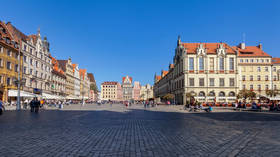Investors continue to put money in Russian sovereign bonds despite threat of sanctions

Russia’s share of JPMorgan’s GBI-EM index, the main global benchmark for emerging market local currency bonds, has grown to 8.3 percent, up from around seven percent two years ago and just 1.5 percent in 2007, new data shows.
Analysts say that the country’s well over half a trillion dollars’ worth of reserves, a competent central bank and conservative fiscal policy make Russia one of the strongest markets, bulletproof to all but the worst-case sanctions. They told Reuters that the new sanctions threats won’t dent the appeal of decent two percent ‘real’ interest rates (rates minus inflation) and one of strongest public balance sheets in the world.
“What we know is that over the past six years since the events in the Ukraine happened, the US and EU have been continually applying sanctions,” said Mirabaud’s head of emerging market debt, Daniel Moreno, adding: “The question is, are these sanctions having any desirable effect (for the West)? I think the answer is definitively ‘no.’”
Talks about the EU abandoning the Nord Stream 2 gas pipeline, combined with falling oil prices and looming US elections, have knocked five to twelve percent off Russia’s ruble, government bond and equity markets over the last few weeks.
Also on rt.com Russian economy recovering from pandemic impact – PutinNevertheless, JP Morgan data showed that its clients were more invested in Russian bonds coming into the current events than at any time in at least the last six years.
High ‘real’ interest rates, along with Russia’s other strong fundamentals, have helped lure back investors, with foreigners owning a record 35 percent of the ruble-denominated OFZ bond market before the Covid-19 outbreak.
Underpinned by its huge reserves of oil and gas, Russia’s debt-to-GDP ratio is expected to be just 20 percent this year – less than a fifth of that of the United States, Britain or France, and under a third of China’s.
For more stories on economy & finance visit RT's business section














